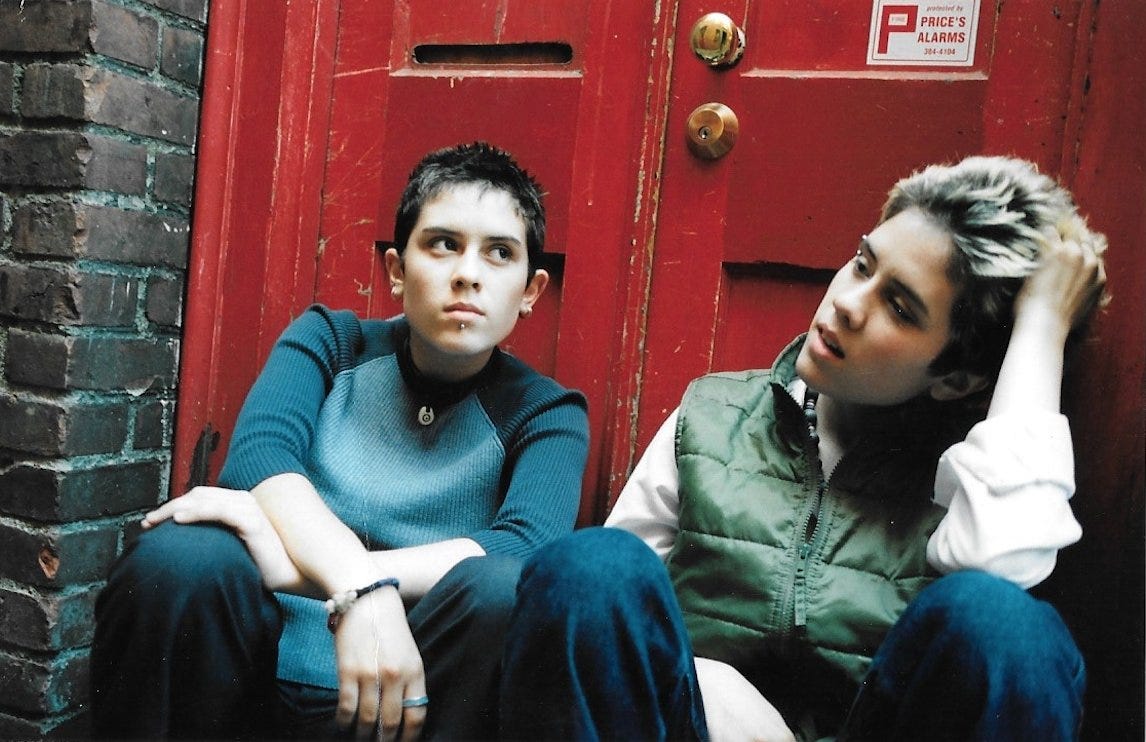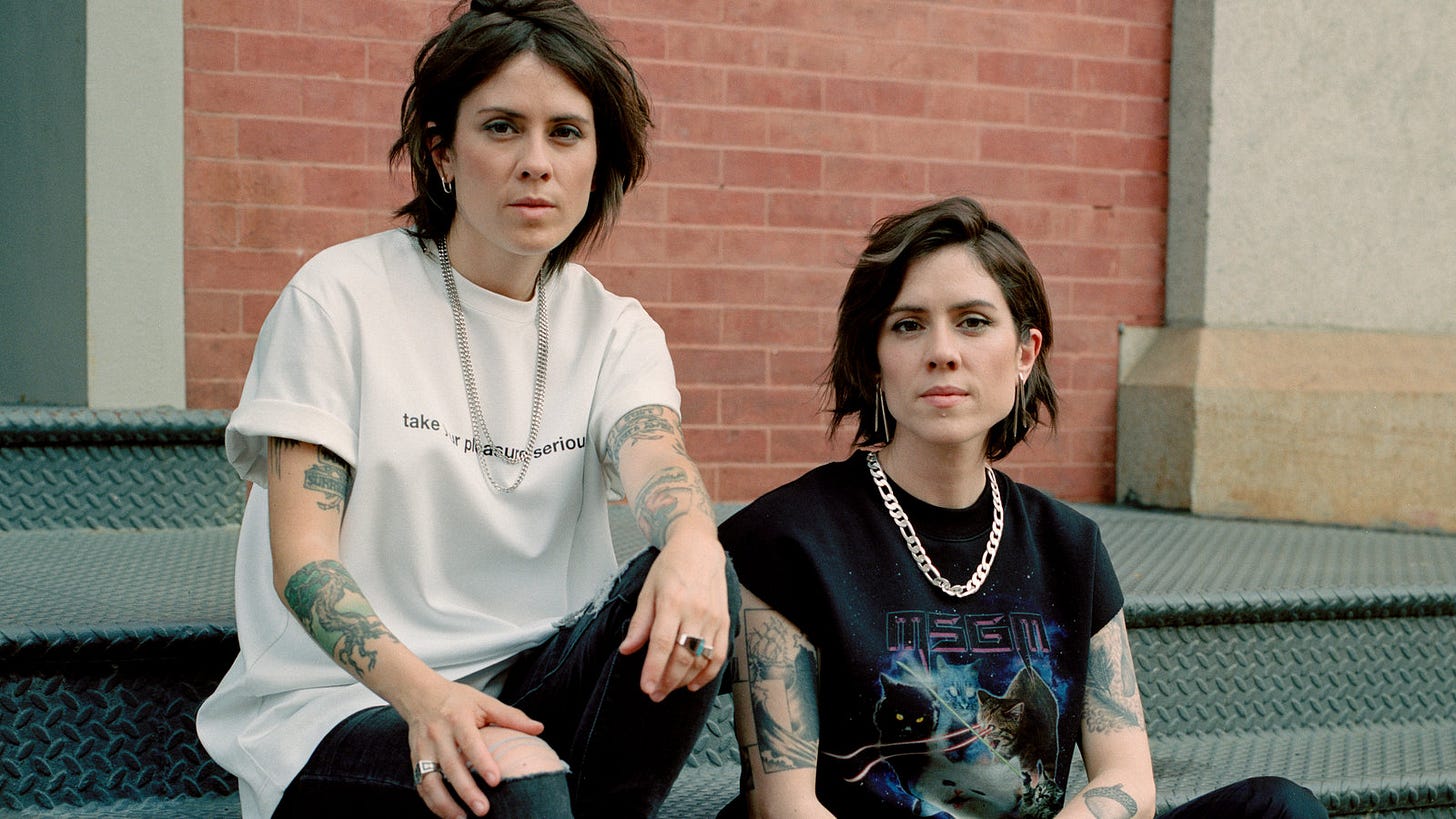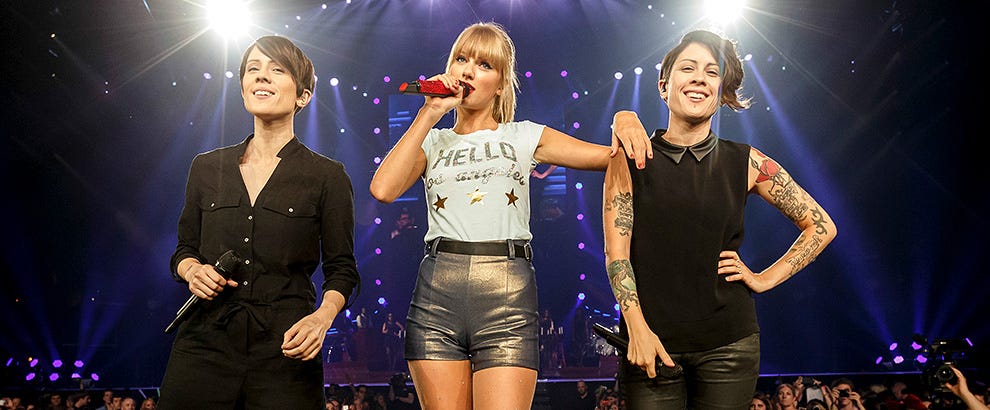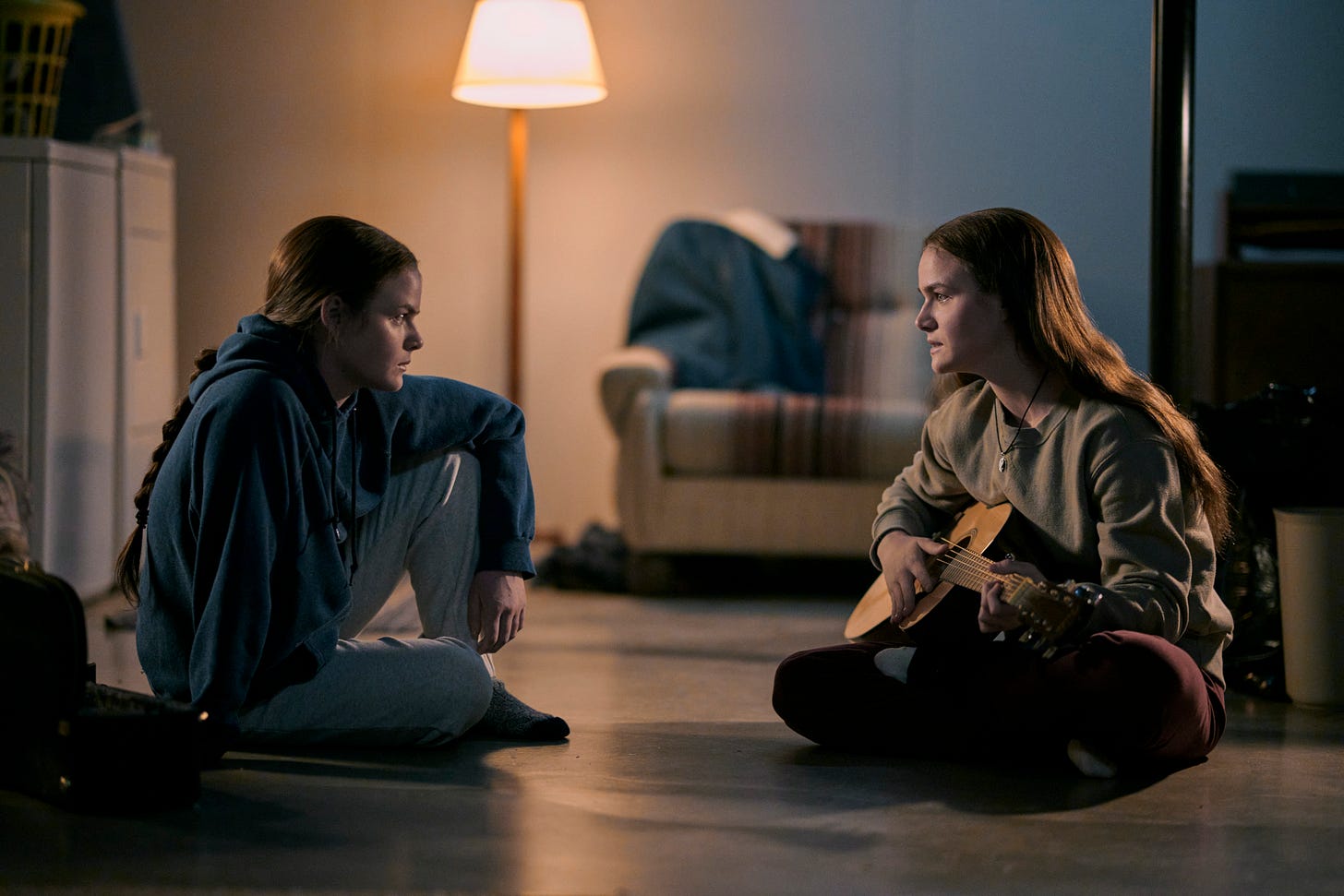Tegan and Sara Are Cementing Their Own Legacy
With a new album and a TV show, the iconic duo are demanding the recognition they deserve
This is the Sunday Edition of Paging Dr. Lesbian. If you like this type of thing, subscribe, and share it with your friends. You can also buy Paging Dr. Lesbian stickers if that strikes your fancy. Support my work by upgrading your subscription.
Tegan and Sara have nothing left to prove, but that hasn’t slowed down their ambitions, not by a long shot. The Canadian duo just released their tenth album last week, and the television series based on their coming-of-age memoir, High School, has been met with widespread critical acclaim. Their album, Crybaby, continues to embrace their post-2013 synth-pop sound while also harkening back to their earlier, guitar-focused years, giving long-time fans and newcomers alike something to dig their teeth into. Meanwhile, the excellent series High School is a heartfelt (and very queer) teen drama as much as it is a compelling origin story for the band.
Though the duo have been at this for over 20 years and have had increasing mainstream success over the last decade, they have never really gotten the recognition they deserve. A look back at their long career illustrates that they have always been ambitious and driven, never content to just coast along on what has worked before. Their recent work – the book, the television show, and the album – represent an attempt to keep pushing as they begin to define their own legacy within an industry that has often denied them such esteem.
High School begins in 1995, when the twins were 15 years old. They don’t even pick up a guitar until halfway through the first season, and they aren’t exactly famous musicians by its conclusion. Tegan and Sara’s first album came out a few years later, in 1998. Their second album, which came out in 2000, was composed primarily of re-recorded songs from the first one. It wasn’t until their third album, If It Was You, that the band really cemented their early sound, which was somewhere in between indie rock and pop punk.
It was their fourth album, So Jealous, that finally got them recognized by the music industry writ large. The White Stripes famously covered their song “Walking With a Ghost,” which immediately afforded them a certain amount of respect, and the album was also featured in Rolling Stones’ annual 50 best albums of the year list in 2004. Tegan and Sara are well aware of what it took to finally get recognition within the male-dominated music industry. “It was actually being accepted by straight men that made the media stop ignoring us because they had to listen to the men that they deemed important,” Sara told Them.

Following the release of So Jealous, Tegan and Sara were famously featured in an episode of The L Word, something Tegan says they still get recognized for (and are very proud to have been a part of). It also helped cement their status as lesbian icons. In 2007 they released The Con, an album that remains a favorite among fans and is often seen as a high point of the first half of their career. Next up was Sainthood, which Sara says is still her favorite of their albums. It was a slight departure from their previous sound, but was met with generally positive reviews from critics.
2013 marked a turning point in their career. They released their album Heartthrob, which was anchored by the smash hit “Closer” and marked their first entry on the Billboard Hot 100. The success of the album skyrocketed them to a level of fame they had never before achieved, allowing them to perform on stage with Taylor Swift and tour with Katy Perry. The 80s-inspired synth-pop of the album would prove to be hugely influential, as Taylor Swift named them as an influence for her critically-acclaimed album 1989, which came out the following year. (Greg Kurstin, who produced most of Heartthrob, also went on to work with Carly Rae Jepson on the similarly 80s-inspired Emotion).
Though this was a huge moment for them, it also upset some of their fans, who accused the band of selling out. “What about us? What about the people that have followed you?” one fan asks in a documentary. Tegan and Sara called their mainstream success a “win,” especially when it comes to queer visibility, and have pushed back against the argument that musicians should be criticized for being successful. Nonetheless, playing bigger venues meant they couldn't connect with fans in the same way. “Our mainstream success created a vast valley between us and them. And it made it seem like we were being embraced and loved and they were still on the outside being left out and marginalized,” Tegan explained. In order to combat this disconnect, they began putting mailboxes at their concerts so fans could send them letters and they could read them before the show and even write back.
Tegan and Sara weren’t about to turn their back on pop music, though, and they released the smash hit “Everything Is Awesome” from The Lego Movie in 2014 and even got a chance to perform at the Oscars. They continued in the pop vein with 2016’s Love You To Death and 2019’s Hey, I’m Just Like You, the latter of which was released in conjunction with their memoir. Though they had been out as lesbians since their early career, Love You To Death was the first album to explicitly touch on queerness, with the song “Boyfriend” being the most obvious example. (“You treat me like your boyfriend / And trust me like a... like a very best friend” the lyrics read). Tegan and Sara remained committed to their LGBTQ fans throughout this time, having started the Tegan and Sara Foundation, which aims to “improve the lives of LGBTQ+ women and girls",” in 2016.
Hey, I’m Just Like You is comprised of re-recordings of demos they wrote as teenagers, and their fresh take on youthful heartbreak and insecurity perfectly encapsulates what they’ve always been about: vulnerability and anxiety, but also hope and self-empowerment. Their most recent album, Crybaby, is a pleasing amalgamation of their earlier work and their more recent pop sound that feels nostalgic without being saccharine. The best example of this is the song “Yellow,” which feels like it could be included on So Jealous but still fits within the album's sonic landscape.
With their tenth album out, it’s difficult to encapsulate the full impact of Tegan and Sara’s career. Much of this is because they have long been underestimated or reduced to their identities in ways that their male peers in the music industry have not. Many early reviews focused heavily on their lesbianism and either likened them to a gimmick or were downright homophobic. A Spin review of So Jealous begins: “Lesbians, sisters, and proud Canucks, this duo was once a Wicca-folk nightmare,” whatever that is supposed to mean. In their review of The Con, Rolling Stone wrote “As lesbians who never reference their oppression or even their sexuality, Tegan and Sara don’t have men to lash out at, put up with, or gripe about.” The author goes on to say that because the songs have no male subjects, the album is “short on drama,” which is offensive but also plainly wrong. (Does Rolling Stone really think lesbians are less dramatic than straight people?)
The most shocking review comes from British mag NME, who wrote that the duo are “quite lovely, even if they do hate cock.” Pitchfork gave them an obnoxious and nonsensical backhanded compliment in their review of The Con, suggesting that “Tegan and Sara should no longer be mistaken for tampon rock, a comparison only fair because of the company they kept.” The fact that they are twins didn’t help, as they were at one point asked by radio hosts if there was something incestuous going on between them. Even reviews that aren’t outright offensive still find it impossible to save the identity cataloging for later. The Guardian's positive review of So Jealous rather inelegantly begins: “Let's get the labels out of the way. Tegan and Sara are 24-year-old lesbian twin sisters from Canada who have been making music for almost a decade.” Conversely, Pitchfork’s review of their 2013 album Heartthrob argued that part of their appeal was that they weren’t as explicitly gay as some other artists, name-dropping Ani Difranco as an example of an ostensibly “gayer” artist.

Unfortunately, their treatment within the industry was not out of the ordinary for women – and especially queer women – at the time. Carrie Brownstein and Corin Tucker of Sleater-Kinney were famously outed by Spin magazine, who revealed the two had dated before either of their parents even knew. Earlier lesbian artists like The Indigo Girls and Melissa Etheridge continue to be discussed primarily in terms of their lesbianism rather than their contributions to music writ large. Tegan and Sara have both pushed back against this impulse that the media has to constantly discuss their sexuality. "I would prefer to be known as a musician, not a 'queer musician.' I'm happy for people to know I'm queer, but I can do that—you don't need to do that,” Tegan told Thrillist.
Tegan and Sara have been through a lot to get to where they are now, and their impact in the music industry is not lost on either of them. “I see a legacy because of what we did and the road we walked,” Sara told Them. “People’s minds were changed in important ways to make space for those kinds of artists and those kinds of bands.” It’s difficult to overstate the importance of Tegan and Sara as a lesbian duo with such longevity. Contemporary alt-pop artists like King Princess and Girl In Red are certainly indebted to the work of Tegan and Sara, but even more mainstream artists like Fletcher and Hayley Kiyoko are part of this lineage.
The notion of “safe spaces” made by and for queer people has become a standard part of our lexicon now, and Tegan and Sara have long been a part of this conversation. They’ve spoken about how their ostracization within the industry made their relationship with the fans all the more profound. “We were othered so much in our career at the beginning, and a lot of our audience, I think, also feel that way. Our shows became a safe space for people to come and see other people like them,” Tegan told Entertainment Weekly. This dialogue has continued today among queer and sapphic artists, even as certain parts of North America have ostensibly become more accepting since Tegan and Sara first arrived on the scene. The lonely path they walked has in part contributed to the queer music landscape we have today.
Now, after nearly 25 years in the business, Tegan and Sara are working to make sure their legacy is set in stone. Their new album, Crybaby, reiterates what’s always made them great without retreading the same old ground. Rolling Stone called the album “tenderly delivered self-criticism,” filled with the kind of wisdom and self-acceptance that only comes with time. What has made their music so compelling for all these years is the combination of earnestness and angst, a self-immolating display of vulnerability. They’ve never been interested in sounding “pretty” in the normative sense, instead focusing on capturing raw emotion – heartbreak, loneliness, self-loathing, longing, and the like. That’s not to say that their melodies aren’t pleasing, but rather to emphasize the fact that they have no desire to soften their sharp edges.
In Crybaby, Tegan and Sara are still wrestling with some of the same questions they pondered as teenagers. In one sense you could read this cyclical trajectory as disheartening, but there’s also something comforting about knowing that even the wisest among us don’t have all the answers. It’s this intense vulnerability that makes their music so engaging, and it’s also the organizing principle of their autobiographical series, High School. Broadly speaking, the show is about falling in love, growing up, working out their relationship with one another, and, perhaps only secondarily, becoming musicians.
Though High School isn’t only about Tegan and Sara’s burgeoning music career, it does illustrate a compelling origin story, something that’s necessary for the creation of a lasting legacy. (Though the notion of writing one’s own legend might seem conceited, it never feels that way, especially with the deft directorial hand of Clea Duvall at the helm.) The aforementioned rawness of their music is given a new context in the series as we’re able to plainly see their influences and the musicians they looked up to at the time. Bands like The Smashing Pumpkins and Nirvana – both of whom feature prominently in the show – were similarly angsty and interested in exploring the darker corners of the human mind.
As far as origin stories go, what’s most important is that we get to see that what they had came naturally to them, and whatever “it” is was something they nurtured and kept with them despite how the industry tried to shape them into something else. Though High School explores some of the darker aspects of teenhood and growing up gay in the ‘90s, it’s also fundamentally hopeful, something that could also be said for even their most angst-filled music. As Ben Travers writes in IndieWire, “It’s an antidote to dramas that paint tragic teen portrait after tragic teen portrait. Sometimes, the kids are all right.”
Despite their treatment by the music industry over the course of their long career, Tegan and Sara have never left behind the earnestness and the vulnerability that made them a success in the first place, the very thing that has endeared them to a legion of queer fans. Though they’ve admitted they’re done trying to prove themselves to the industry, their recent cultural contributions are certainly proof that they have always deserved our attention. “We refuse to feel ashamed,” Tegan said in 2016. “Cause we felt ashamed then and we don't anymore. Now we wear it as a badge of honor.” Thanks to their own stubborn determination and refusal to be pushed aside, their time has finally come. It’s up to the rest of the world to catch up.





